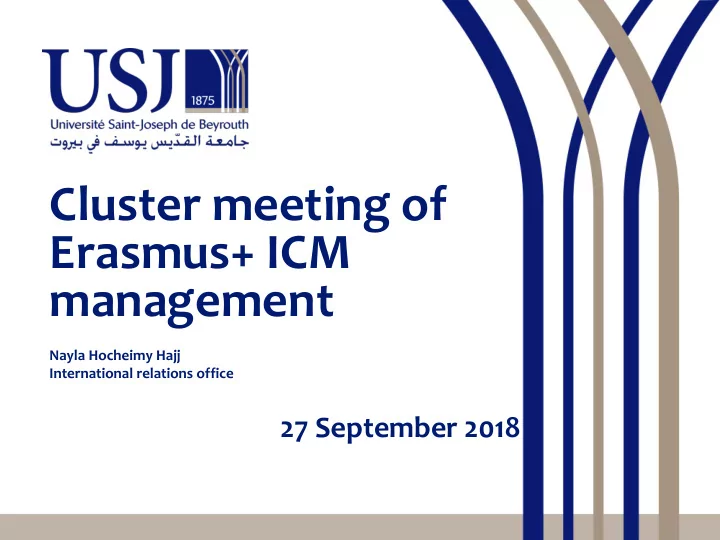

Cluster meeting of Erasmus+ ICM management Nayla Hocheimy Hajj International relations office 27 September 2018
Global outreach 342 active bilateral agreements 221 partner institutions 43 countries around the world 7 Erasmus Mundus projects (paved the way to…) 30 Erasmus+ ICM partners (representing approx. 9% of total agreements), most of them being at their second and third round. 66.6% of these institutions are already USJ partners through bilateral agreements Impact of E+ ICM on sustainability of partnerships 2
List of our E+ ICM partners • Aix-Marseille Universoity (France) • Babes Bolyai University in Cluj (Romania) • Université de Bordeaux (France) • University of Deusto (Spain) • EMUNI network (Slovenia) • Ecole Nationale des Ponts-et-Chaussées (France) • Frei University Berlin (Germany) • University of Granada (Spain) • Sciences Po Paris (France) • JAMIES network (Portugal) • Institut Polytechnique Lasalle Beauvais (France) • Masaryk University (Czech Republic) • University of Minho (Portugal) • Université de Montpellier (France) • Université de Namur (Belgium) • Panteion University of social and political sciences (Greece) • Université Paris 1 Panthéon Sorbonne (France) • Powislanski College in Kwidzyn (Poland) • University of Santiago de Compostela (Spain) • Tampere University of applied sciences TAMK (Finland) • Aristotle University of Thessaloniki (Greece) • Université Paris 3 Sorbonne Nouvelle (France) • Ignatianum Jesuit University in Krakow (Poland) • University of Torino (Italy) • Autonoma University of Madrid (Spain) In 12 countries across Europe: Belgium, • Autonoma University of Barcelona (Spain) • Université Catholique de Louvain (Belgium) • University of Castilla la Mancha (Spain) • Uninettuno (Italy) France, Romania, Portugal, Greece, Finland, Italy, Poland, • University of Sapienza (Italy) Germany, Slovenia, Spain & Czech Republic 3
STUDENT MOBILITY • Over 200 INCOMING students per year • Over 200 OUTGOING students per year → E+ ICM scholarship holders ratio: ▪ 12% in 2016/17 ▪ 17% in 2017/18 ▪ 21.4% in 2018/19 (1 st semester only) 4
E+ in OUTGOING STUDENT MOBILITY 1 st semester 18/19 3% discount on tuitions 12% other scholarships 63.5% no E+ ICM scholarships scholarships 21.4% 5
Student mobility procedures • Info sessions are organized on all campuses through out the year. • Call for application is published on our website, sent through mass mail to all the university community and promoted via social media platforms • Applicants go through individual interviews, profile screening, before filling USJ’s forms. • Selection criteria: grades, financial aid, motivation, language • Nomination made by the international relations office followed by specific E+ application procedure • Orientation meeting for all outgoing students prior to their mobility • Visa support • Follow-up is ensured during mobility period • Satisfaction reports and surveys are mandatory upon return • Dissemination of results and promotion of E+ ICM in USJ’s publications, reports, magazines and social media 6
Erasmus+ STAFF MOBILITY Since 2015/2016, USJ has implemented 90 staff mobilities funded by E+ ICM in various fields. Balanced distribution: • 44 incoming • 46 outgoing Type: • 49% academic staff • 51% administrative staff 7
Positive impact of E+ ICM • Promotion of intercultural dialogue (student mobility) • New Joint research opportunities (academic staff mobility) • Exchanges on university governance (administrative staff mobility) • New partner institutions & countries • Allows and encourages – through such meetings – exchange between Lebanese universities 8
Management system of E+ ICM → Central management by the International relations Office ▪ Gives the best insight and a global overview of all available/implemented scholarships ▪ Allows targeting actions ▪ Respects the principle of a balanced distribution ▪ Offers help & support to all interested candidates ▪ Ensures transparency in disseminating calls for application 9
10
DIFFICULTIES & OBSTACLES (1) • Little involvement in the application process prior to funding • Limited access to info during the application for funding process • Signature of inter-institutional agreement prior to funding • Change in number of scholarships allocated • Very small number of scholarships granted per country (not by institution) → Info on impact & dissemination of results! • Timing of open calls for application 11
DIFFICULTIES & OBSTACLES (2) • Understaffed IRO in partner countries • Unrealistic “contribution to travel cost” • Insufficient per diem for staff • No administrative fees • Bank account issues (example of Spain) • Slow administrative procedure in scholarship payment for students & staff • Various flight booking procedures (confusing) 12
Thank you 13
Recommend
More recommend